Michael Dibdin - A Rich Full Death
Here you can read online Michael Dibdin - A Rich Full Death full text of the book (entire story) in english for free. Download pdf and epub, get meaning, cover and reviews about this ebook. genre: Detective and thriller. Description of the work, (preface) as well as reviews are available. Best literature library LitArk.com created for fans of good reading and offers a wide selection of genres:
Romance novel
Science fiction
Adventure
Detective
Science
History
Home and family
Prose
Art
Politics
Computer
Non-fiction
Religion
Business
Children
Humor
Choose a favorite category and find really read worthwhile books. Enjoy immersion in the world of imagination, feel the emotions of the characters or learn something new for yourself, make an fascinating discovery.

- Book:A Rich Full Death
- Author:
- Genre:
- Rating:4 / 5
- Favourites:Add to favourites
- Your mark:
- 80
- 1
- 2
- 3
- 4
- 5
A Rich Full Death: summary, description and annotation
We offer to read an annotation, description, summary or preface (depends on what the author of the book "A Rich Full Death" wrote himself). If you haven't found the necessary information about the book — write in the comments, we will try to find it.
A Rich Full Death — read online for free the complete book (whole text) full work
Below is the text of the book, divided by pages. System saving the place of the last page read, allows you to conveniently read the book "A Rich Full Death" online for free, without having to search again every time where you left off. Put a bookmark, and you can go to the page where you finished reading at any time.
Font size:
Interval:
Bookmark:
Michael Dibdin
A Rich Full Death
BOOK ONE
1
Florence
6th February 55
My dear Prescott,
You will no doubt be surprised to receive another letter so soon, but I have news which cannot await my monthly packet. Prepare yourself for a shock, for I have sad and dramatic tidings: Isabel Eakin, nee Allen, is no more, having passed away yesterday evening under tragic circumstances-of which more in a moment. What a piece of my life-of both our lives-falls into oblivion with her! Death must always diminish the survivors, but when I consider how intimate a part of my life Isabel once was, I feel half-dead myself at the thought of all she has taken with her to the grave.
How vividly I recall those long summer afternoons we spent together-you and I and she, and that freckly cousin whose name and face and indeed everything except her freckles I presently forget. Is it really fifteen years ago? Mighty fine young fellows we thought ourselves then, as I remember; with the bloom of college still fresh on us, like hothouse peaches. I forget exactly how or when we discovered that there were mysteries of which our professors had said nothing (and perhaps had nothing to say), such as the miraculous transformation of scrawny little Isabel-previously the butt of much boyish torment on my part-into a fascinating and powerful figure with capacities of her own for inflicting torment.
I was in love with her, of course. Was I the only one? Own up, Prescott-were you not just as assiduous as I at inventing pretexts for calling at the Allens house as often as possible? Strange to think that we stood, without knowing it, at one of the great crossroads of Life: we might have married her, either of us, and then everything would have been utterly different.
Well, well, all that is over now-separated by a desert of sterile years from the comfortable pastures of the Present. For what did happen? You launched yourself energetically on your academic career, married a woman who would loyally support you, and won fresh laurels with every year that passed-modestly at first, but set already on course to your present Parnassian position: a Professor yourself, author of a standard text on ethics-and all this at the age of forty!
I also achieved much-in my dreams. If plans, projects, or proposals counted for aught, I should be numbered among the greatest men of our age! What was I not going to write? An epic poem in twelve books on the War of Independence; Washington, a tragedy in five acts; a three-volume novel about a young mans picaresque travels through every state of the union, combining Smolletts dash and colour with the sentimental depths of Young Werther. I was, as you see, going to do much; so much that in the end I did nothing. Not content, like you, to reach for graspable gains, I have remained empty-handed.
And then, to cap so much failure and frustration, came Isabels refusal-definitive and irrevocable-of my belated proposal of marriage. I am loath to speak ill of the dead, but she erred-of that I am convinced. At all events, after that I could stand no more: the very streets of Boston sickened me, the air seemed contagious and every face mean, stupid and provincial. I set out for the Old World with a heart as full of high expectations as any of our founding fathers making the journey to the New. Expectations which have been fulfilled, for here I have found minds to my measure, kindred spirits, and a fresh start.
Apart from fleeting appearances in my dreams, I had neither seen nor heard of Isabel for over twelve years when suddenly, in the course of a second-rate ball at the Baths of Lucca last summer, I found myself face to face with her. And when I say her, I mean with that lithe bewitching figure I had last seen amid the apple trees and dappled sunlit vistas of the Allens garden-that superb type of American womanhood: vivacious, proud, high-spirited. The long years between had left no mark on her whatever. But then was that not the keynote she perpetually sounded: of one who, whatever befell, remained untouched?
If so, it was an illusion which was most cruelly dispelled last night. Poor child, to end thus!
First, though, let us leaven these sad tidings with some happier ones. Congratulate me, Prescott, for I awake this morning the confirmed acquaintance of Elizabeth Barrett Browning and her husband! Nor shall I stray entirely from my darker theme, for by a bizarre coincidence-if indeed it is no more than that-the circumstances are connected with the terrible details of Isabels death.
Yesterday I was invited to dine by James Jackson Jarves, the Ruskinist-I have already recounted how I made his acquaintance apropos the Primitive altarpiece in Sansepolcro he wanted for his collection. That came to nothing, unfortunately, the monks proving too grasping, but the connection between us has remained, and one result was an invitation to Sunday dinner, where I was one of a dozen guests picked from the cream of the Anglo-American community here. (Jarvess Wednesday dinners are even more select, but I cannot hope for so much as yet.)
At all events, the gathering was an occasion to remember, and not only as a milestone in my standing here. Nevertheless, I was once again disappointed, at heart. How can I explain? It was all very worthy, the conversation was enlightening and cultivated-and yet, and yet! Where was the spark? The question may seem gratuitous, yet it is one which occurs to me with more and more force the longer I stay in this city where one is confronted on every side by evidence of the genius of the Past; where such figures as Giotto, as Dante, as Michelangelo, are as it were ones daily bread. Where are the names today that might be heard in such company?
On my way home from Jarvess I encountered a man who, in his own estimation at least, is such a one. I mean Mr Hiram Powers, who rejoices in the happy position of being able to sell copies of his Greek Slavegirl for-one hears-some four thousand dollars apiece. Success, I am happy to report, has not had the slightest adverse effect on his character: he has always believed himself to be assured of a place among the immortals and the acclaim of two continents has done nothing to shake this opinion. He is, no doubt, a genius-but whether it be his mid-Western manners or the fawning adulatory throng which surrounds him, I cannot delight in his company. In short, he does not inspire me-although his studio has been a fruitful source of social encounters.
As I was strolling back through the fast-gathering dusk, then, who should I spy ahead of me in the street but just this same Yankee stonecutter. Where was I going? Home; and he? Off to take coffee with the Brownings, who are close friends of his-you may perhaps have seen her pretty sonnet on his Greek slave-piece. Powerss casual words electrified me, for I have had my sights on Mr and Mrs Browning for some time, although well aware of the challenge; for they are difficult of access-a very social Alp; remote, elevated, and somewhat chilly.
I neither batted an eyelid nor faltered in my step, however; merely remarking as we proceeded down the street together that I had lately gone-after hours, being privileged by a personal contact, for the press of tourists during the day is a horrible example of Democracy in action, making it impossible for any to appreciate what all would enjoy-I had gone, I said, to view the Medici Venus, which I had long considered the acme of artistic perfection. Indeed-I continued-its inimitable qualities might well cause me, were I a sculptor, to throw away my chisel in sheer despair.
Now I must explain that my reasons for advancing this banal opinion were by no means purely aesthetic. I happen to know that Mr Powers has an exceedingly low opinion of the Venus, which he is fond of comparing to its disadvantage with his own work. Nor did I succeed in altering his views during our brief walk, but my companion became so warm on the subject that he was still holding forth when we arrived at the wedge-shaped palace where the Brownings live, secreted from the world like a monastic order of two. Loth to interrupt the coruscating flow of my companions ideas, I took it upon myself to ring the bell; and there I still was when Mr Robert Browning came in person to open the door, leaving him little alternative but to admit me too. I was in the seventh heaven! To be permitted to worship at the feet of the poetess of the age is a favour eagerly sought after by all who live in or pass through Florence. But though many are called, few are chosen, and to be numbered among that elect band-well, I need not labour the point.
Font size:
Interval:
Bookmark:
Similar books «A Rich Full Death»
Look at similar books to A Rich Full Death. We have selected literature similar in name and meaning in the hope of providing readers with more options to find new, interesting, not yet read works.
Discussion, reviews of the book A Rich Full Death and just readers' own opinions. Leave your comments, write what you think about the work, its meaning or the main characters. Specify what exactly you liked and what you didn't like, and why you think so.



